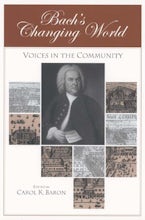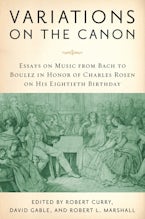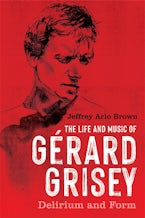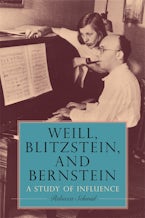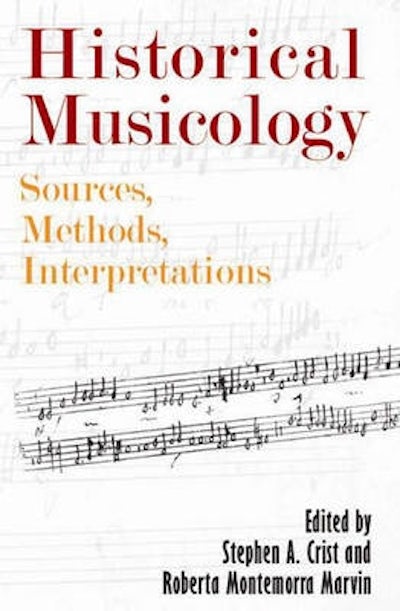
Title Details
443 Pages
22.8 x 15.2 cm
11 b/w, 106 line illus.
Series: Eastman Studies in Music
Series Vol. Number:
28
Imprint: University of Rochester Press
Historical Musicology
Sources, Methods, Interpretations
- Description
- Contents
- Reviews
Seventeen studies by noted experts that demonstrate recent approaches toward the creative interpretation of primary sources regarding Renaissance and Baroque music, Mozart, Beethoven, Mendelssohn, Verdi, Debussy, and beyond.
How do we know what notes a composer intended in a given piece? -- how those notes should be played and sung? -- the nature of musical life in Bach's Leipzig, Schubert's Vienna? -- how music related to literature and other arts and social currents in different times and places? -- what attitudes musicians and music lovers had toward the music that they heard and made?
We know all this from musical manuscripts and prints, opera libretti, composers'letters, reviews in newspapers and magazines, archival data, contemporary pedagogical writings, essays on aesthetics, and much else. Some of these categories of sources are the bedrock of music history and musicology. Others havebegun to be examined only in recent years.
Furthermore, musicologists -- including biographers of famous composers -- now explore these various kinds of sources in a variety of ways, some of them richly traditional and others exciting and novel.
These seventeen essays, all newly written, use a wide array of source materials to probe issues pertaining to a cross section of musical works and musical life from the sixteenth through the twentieth centuries.
The resulting, pluralistic profile of current musicology will prove welcome to anyone fascinated by the problems of reconstructing -- reimagining, sometimes -- the evanescent musical art of the past and pondering its implications for musical life today and in the future.
Roberta Montemorra Marvin is a Research Fellow at the Obermann Center for Advanced Studies at the University of Iowa where she is also Director of the Institute for Italian Opera Studies; Stephen A. Crist is associate professor and chair of the Music Department at Emory University.
How do we know what notes a composer intended in a given piece? -- how those notes should be played and sung? -- the nature of musical life in Bach's Leipzig, Schubert's Vienna? -- how music related to literature and other arts and social currents in different times and places? -- what attitudes musicians and music lovers had toward the music that they heard and made?
We know all this from musical manuscripts and prints, opera libretti, composers'letters, reviews in newspapers and magazines, archival data, contemporary pedagogical writings, essays on aesthetics, and much else. Some of these categories of sources are the bedrock of music history and musicology. Others havebegun to be examined only in recent years.
Furthermore, musicologists -- including biographers of famous composers -- now explore these various kinds of sources in a variety of ways, some of them richly traditional and others exciting and novel.
These seventeen essays, all newly written, use a wide array of source materials to probe issues pertaining to a cross section of musical works and musical life from the sixteenth through the twentieth centuries.
The resulting, pluralistic profile of current musicology will prove welcome to anyone fascinated by the problems of reconstructing -- reimagining, sometimes -- the evanescent musical art of the past and pondering its implications for musical life today and in the future.
Roberta Montemorra Marvin is a Research Fellow at the Obermann Center for Advanced Studies at the University of Iowa where she is also Director of the Institute for Italian Opera Studies; Stephen A. Crist is associate professor and chair of the Music Department at Emory University.
Introduction: Scholarly Inquiry in Historical Musicology: Sources, Methods, Interpretations - Roberta Marvin
A Collaboration between Cipriano de Rore and Baldissera Donato? - Jessie Ann Owens
New Perspectives on Bach's Great Eighteen Chorales - Russell Stinson
Historical Theology and Hymnology as Tools for Interpreting Bach's Church Cantatas: The Case of Ich elender Mensch, wer wird mich erlösen, BWV 48 BWV 48 - Stephen Crist
Performance Practice Issues That Affect Meaning in Two Bach Instrumental Works - Michael Marissen
Mozart's Mitridate: Going beyond the Text - Ellen T. Harris
Carl Philipp Emanuel Bach and the Aesthetics of Patricide - Richard Kramer
Joseph Haydn's Influence on the Symphonies of Antonio Rosetti - Lawrence F. Bernstein
Reason and Imagination: Beethoven's Aesthetic Evolution - Maynard Solomon
Schubert as Formal Architect: The Quartrttsatz, D.703 - Lewis Lockwood
Sex, Sexuality, and Schubert's Piano Music - Jeffrey Kallberg
"Le Belle Exécution": Johann Nepomuk Hummel's Treatise and the Art of Playing the Pianoforte - Mark Kroll
"For You Have Been Rebellious against the Lord": The Jewish Image in Mendelssohn's Moses and Marx's Mose - Jeffrey Sposato
Andrea Maffei's "Ugly Sin": The Libretto for Verdi's I masnadieri - Roberta Marvin
Mozart's Piano Concertos and the Romantic Generation - Claudia Macdonald
"Wo die Zitronen blühn": Re-Versions of Arie antiche - Margaret Murata
Material Culture and Postmodern Positivism: Rethinking the "Popular" in Late-Nineteenth Century French Music - Jann Pasler
Otto Gombosi's Correspondence at the University of Chicago - Laurence Libin
A Collaboration between Cipriano de Rore and Baldissera Donato? - Jessie Ann Owens
New Perspectives on Bach's Great Eighteen Chorales - Russell Stinson
Historical Theology and Hymnology as Tools for Interpreting Bach's Church Cantatas: The Case of Ich elender Mensch, wer wird mich erlösen, BWV 48 BWV 48 - Stephen Crist
Performance Practice Issues That Affect Meaning in Two Bach Instrumental Works - Michael Marissen
Mozart's Mitridate: Going beyond the Text - Ellen T. Harris
Carl Philipp Emanuel Bach and the Aesthetics of Patricide - Richard Kramer
Joseph Haydn's Influence on the Symphonies of Antonio Rosetti - Lawrence F. Bernstein
Reason and Imagination: Beethoven's Aesthetic Evolution - Maynard Solomon
Schubert as Formal Architect: The Quartrttsatz, D.703 - Lewis Lockwood
Sex, Sexuality, and Schubert's Piano Music - Jeffrey Kallberg
"Le Belle Exécution": Johann Nepomuk Hummel's Treatise and the Art of Playing the Pianoforte - Mark Kroll
"For You Have Been Rebellious against the Lord": The Jewish Image in Mendelssohn's Moses and Marx's Mose - Jeffrey Sposato
Andrea Maffei's "Ugly Sin": The Libretto for Verdi's I masnadieri - Roberta Marvin
Mozart's Piano Concertos and the Romantic Generation - Claudia Macdonald
"Wo die Zitronen blühn": Re-Versions of Arie antiche - Margaret Murata
Material Culture and Postmodern Positivism: Rethinking the "Popular" in Late-Nineteenth Century French Music - Jann Pasler
Otto Gombosi's Correspondence at the University of Chicago - Laurence Libin
"In this book some of the best minds in current musicology explore untrodden territory. They show that the classic source study and the traditional methods of musical analysis are not only alive and kicking, but generating new rich ideas -- some of them controversial, all of them stimulating. --Nicholas Temperley, professor emeritus of musicology, University of Illinois, and author of Bound for America: Three British Composers" .
"Striding onto the stage of the 'New Musicology', the seventeen contributors to Historical Musicology proceed to kick in the footlights. Out of the broken glass, they manage to create an approach to the scholarly study of music that recognises that musical scholarship [whatever its methodological imperatives] remains rooted in the study of primary sources, and go on to demonstrate brilliantly how the benefits of the 'New' can be combined with the 'Old'." Mark Everist, professor of music, University of Southampton
Paperback
9781580463010
October 2008
£40.00 / $49.95
Title Details
443 Pages
2.28 x 1.52 cm
11 b/w, 106 line illus.
Series: Eastman Studies in Music
Series Vol. Number:
28
Imprint: University of Rochester Press


